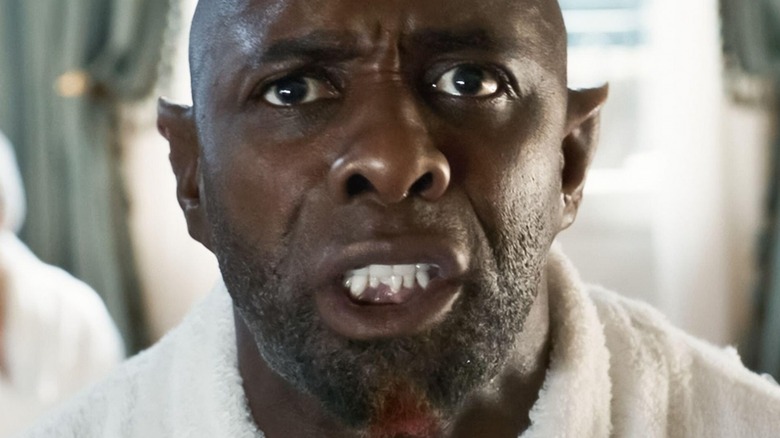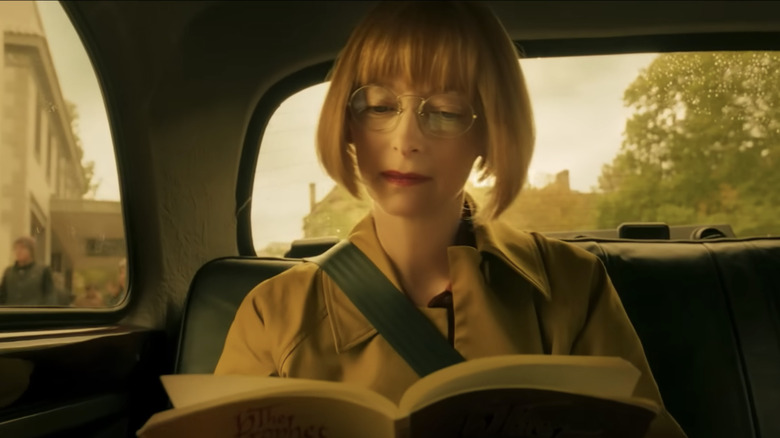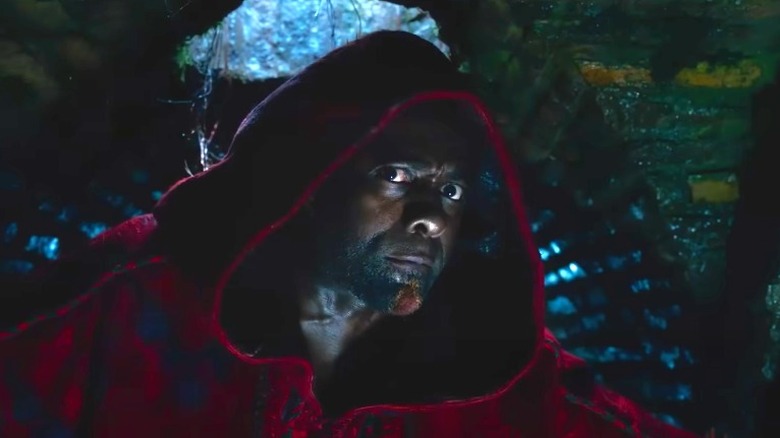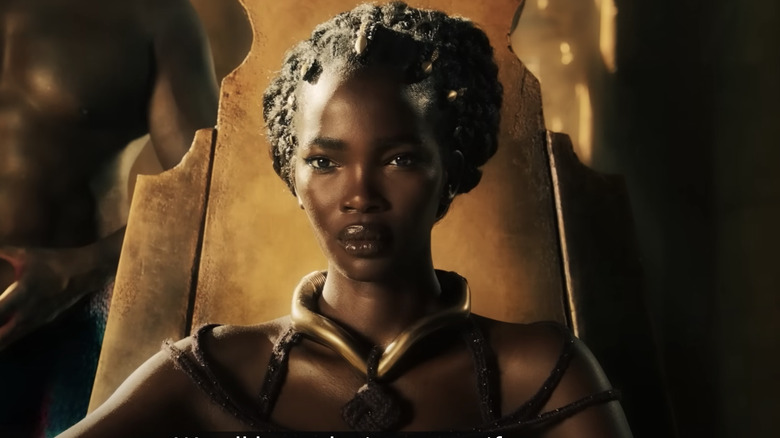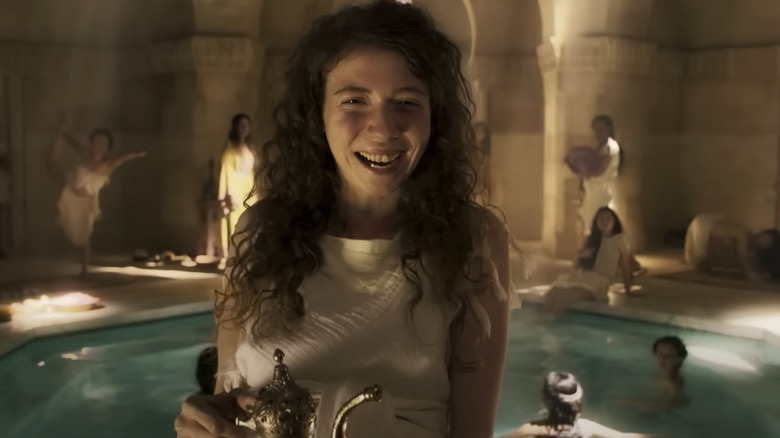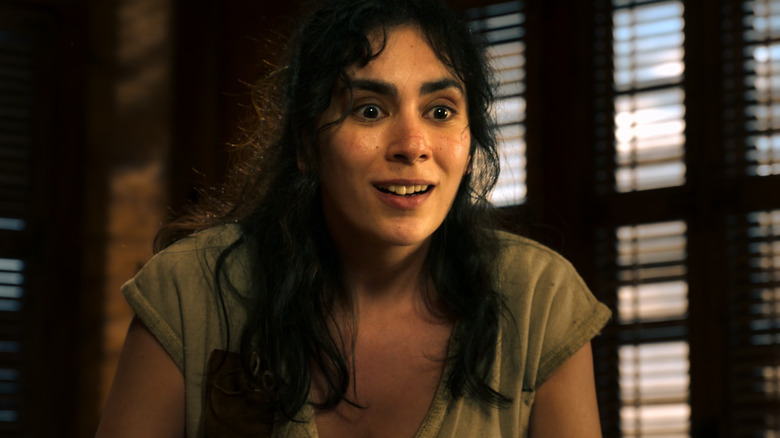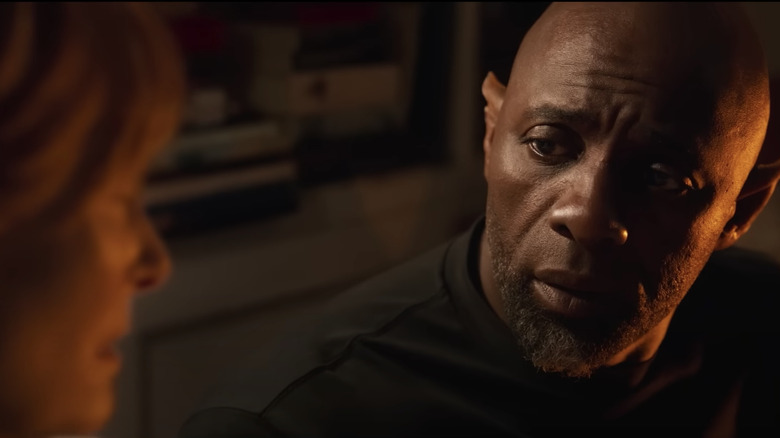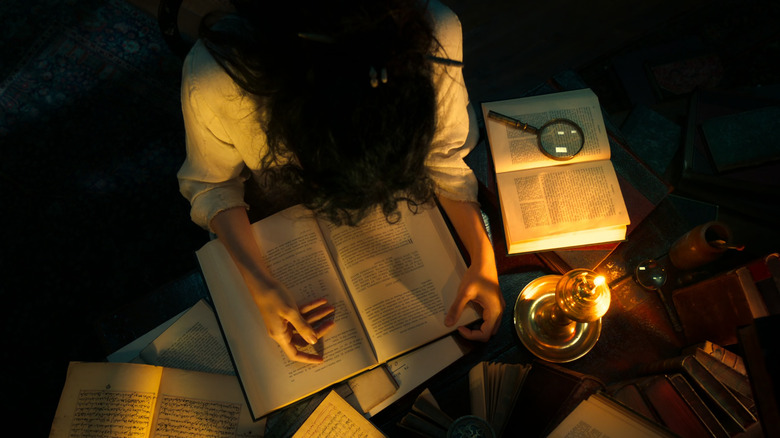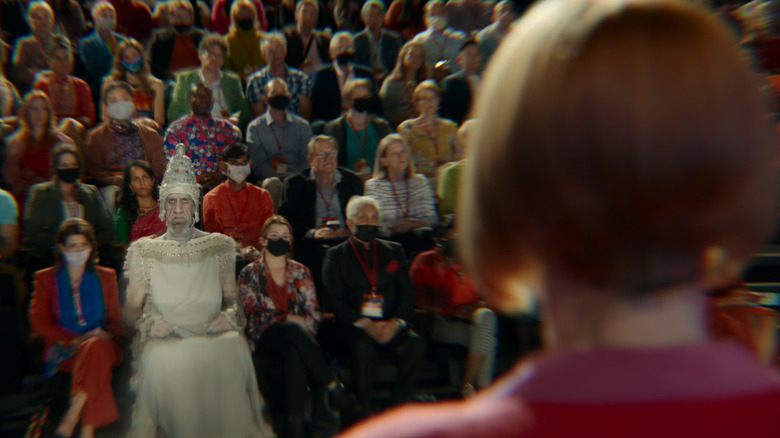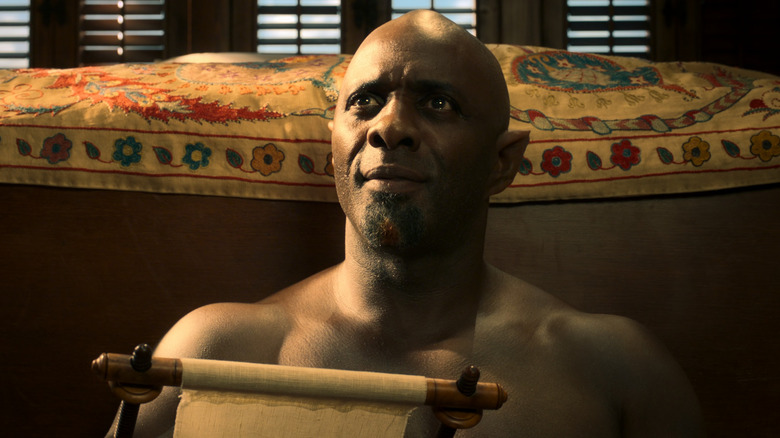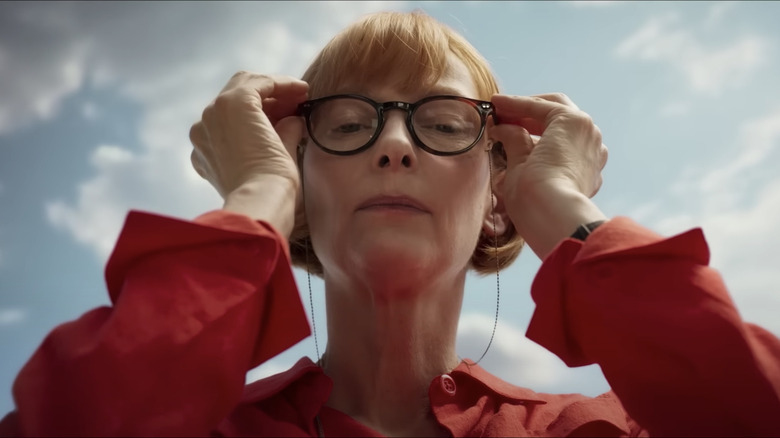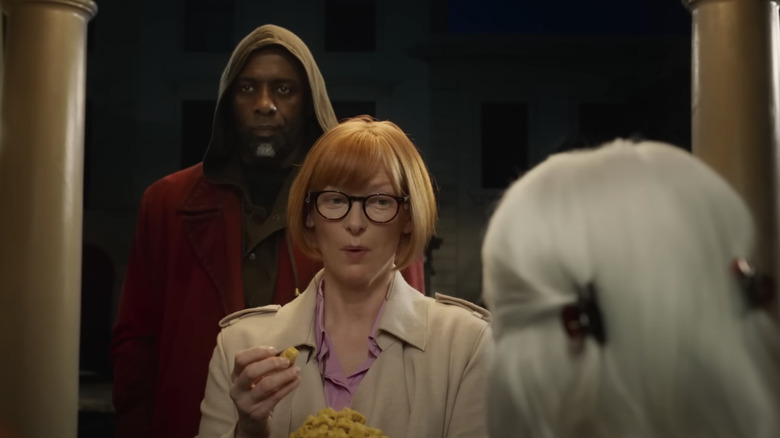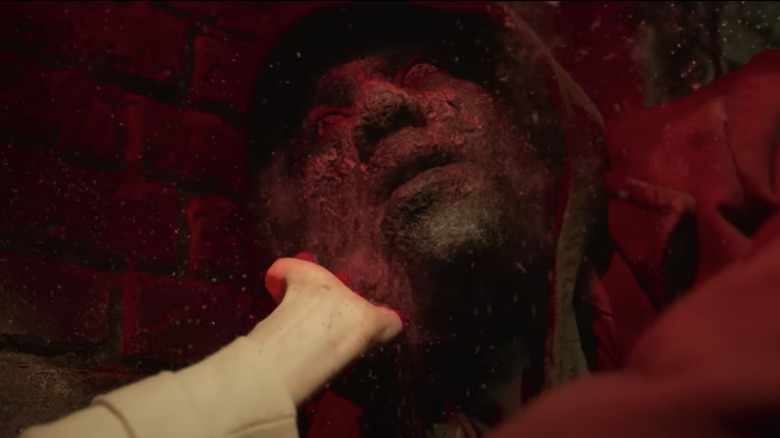The Ending Of Three Thousand Years Of Longing Explained
You probably know director George Miller, whether it's for his work perfecting automotive action on the "Mad Max" movies, the rousing family adventure of "Happy Feet," or the dark comedy of "The Witches of Eastwick," where Jack Nicholson memorably plays the devil. However fans may know his work, his latest film, "Three Thousand Years of Longing," bears all the hallmarks of a Miller movie: an epic setting, a sweeping story, vivid colors, and over-the-top setpieces.
"Three Thousand Years of Longing" also boasts some serious star power among its cast of diverse talents. The Djinn is played by Idris Elba, who towers over Tilda Swinton's Alithea with fabulous pointed ears (seriously, the ears are Spock-level iconic here). Alithea, a narratologist (yes, that's a real thing), is traveling through Istanbul for a conference when she accidentally frees a Djinn. Alithea is unique — not only does she know the dangers of dealing with a genie (she studies stories and myths, after all), but she's content and doesn't want anything. In order to convince her to make three wishes, which will allow him to be free, the Djinn begins, Shaherazade style, to spin her three stories of the women he loved before.
While reviews for "Three Thousand Years of Longing" have been primarily positive, the film fell short at the box office, though perhaps this is down to the limited marketing Amazon gave it after purchasing MGM. This ode to the power of storytelling is based on a short story called "The Djinn in the Nightingale's Eye" written by A.S. Byatt ("Possession"), which George Miller and his daughter Augusta Gore adapted into a screenplay. The film's visually stunning exploration of history is a love story at its core, though the ending might leave viewers with one question: Is the Djinn free or not?
A woman who loves stories
Tilda Swinton stars as the logical, perfectly content Alithea, a divorced narratologist traveling through Turkey for a conference. While cleaning a glass bottle she found at a shop, a Djinn suddenly fills the room and offers her three wishes. Confident, capable, and pleased with her independence, she refuses, prompting the Djinn to tell her three stories of love and grief. By the end of the three stories, Alithea has a wish: to be in love with the Djinn and for him to love her in return so she might know such longing and passion.
It's a unique premise, and one that's helped by the excellent acting of Swinton and Elba. Alithea is initially skeptical of the Djinn's motives, believing he will trick her and that she will eventually regret her wishes. In the end, Alithea can't resist the image of love he crafts in his stories, finally telling him, "I'm here to love you. I wish for you to love me in return. I want our solitudes to be together. I want that love professed in ageless tales."
But on their return to London, they discover that the Djinn, an electromagnetic being, can't survive in the modern world. Alithea uses her second wish to beg him to speak to her after she finds him unconscious in the basement, and her third and final wish to let him return to a realm where he can survive, though he occasionally returns to visit her. Does he really love her? Is he genuinely free, or does he return out of obligation? The ending leaves it ambiguous, though both appear content with their unusual arrangement. The final scenes suggest that love cannot exist where it's forced, a central theme of the film.
A lonely Djinn
The Djinn (Idris Elba) is a surprising character. Alithea tells the audience that Djinn are tricksters, serving only themselves, yet the Djinn in "Three Thousand Years of Longing" is a "god-fearing" genie, a creature of passion and deep emotions. In short, a lover, not a fighter. Is he trying to trick Alithea with his stories of love and confinement, trying to convince her to use her wishes? Perhaps. Alithea tries to wish for three simple things (a breakfast sweet, for example), but the Djinn tells her these don't count. The wishes must be something she truly desires.
The Djinn's stories convince her to use her wishes; she wants to be loved after all. The Djinn never says he loves her before her wish, nor does he smile or seem particularly excited when she says she wants him to love her. There are clues and hints that Alithea is similar to his previous lover, Zefir.
Despite her wishes, the Djinn doesn't belong in the London of 2022, where wi-fi and cellphone signals fill the air and disrupt his electromagnetic essence. He can't find a place for himself. Is that because fairytale love can't exist in the modern world? Or because magic can't? Either way, the Djinn fades, dry flakes of his skin floating around Alithea's house rather than his usual glittery glow. After she uses her second wish to wake him when he's unconscious in her basement, Alithea realizes she's trapped the Djinn for her own ends and releases him, allowing him to return to her willingly when he wishes. They no longer share their solitude, as Alithea wished, but they come together when they need a break from it.
For the love of a queen
The Queen of Sheba is a historical figure synonymous with beauty and wealth. As he tells Alithea in his first story, the Djinn knew Sheba (Aamito Lagum) and was also madly in love with her. While the story he tells has almost no basis in the few historical facts we know about her life, the whole of "Three Thousand Years of Longing" is presented as a fairytale from the start, so it's free to take some liberties. Elba told Entertainment Weekly that the story of the Djinn's love affair with Sheba was his favorite segment to film, not only because it was the happiest time for his character but because it was like "stepping back in time" on set.
The Djinn's story of the Queen of Sheba is the tale of his first capture and imprisonment in his brass bottle. King Solomon comes to Sheba, courting her with magical instruments and gifts. Sheba sets him tasks to prove his love to her, which he completes by using his abilities to talk to animals and monsters. The Djinn warns Sheba that Solomon doesn't love her and seeks to change her, but Sheba disregards his warnings, and the Djinn is captured because he refuses to leave her. As the Djinn asks Alithea, "How can it be a mistake to love someone entirely?"
The story of Sheba stands as a warning about the dangers of losing oneself completely in the love of another person.
A fearless concubine
The Djinn's second relationship is with a concubine in the palace of Suleiman, a sultan during the Ottoman Empire. Gülten (Ece Yüksel) loves Mustafa, the sultan's son, and uses her wishes to force Mustafa to fall in love with her, leading to her carrying his child. These wishes set off a chain of events that results in the death of Mustafa and Gülten, leaving the Djinn to wander the palace alone for 100 years, unseen and unheard. His loneliness and desire to be found by someone in the palace is heartbreaking, as he does everything he can to be seen. Again, historic liberties have been taken here, but Suleiman's reign and the murder of his son Mustafa were events that happened in the 16th century.
Gülten is an outlier amongst the women the Djinn has loved and cared for; by the time they meet, Gülten is already in love with someone else, the son of the Sultan. However, she chooses unwisely when using her wishes, insisting on having all she wants, despite the dangers. The Djinn was an active participant in the Queen of Sheba's story, loving her romantically as he did. But in Gülten's case, he must watch as her destructive story unfolds, and he learns the dangers of making wishes for the sake of love.
The trapped genius
Zefir (Burcu Gölgedar) is the final woman in the Djinn's stories, and as he tells us, the most important — the one he loved the best. Zefir is a genius, though uneducated, and trapped in a loveless marriage to an older man. This creative and brilliant woman invents amazing machines, though she's destined to remain nameless in history. When she discovers the Djinn, she wishes to learn, a wish the Djinn is happy to fulfill.
The next scene shows Zefir speed-reading a book in her room. Eagle-eyed watchers might have noticed her leg bouncing up and down, just like Alithea's does when she's speed reading on the plane. In another scene, she bursts into a room wearing glasses on her nose, again drawing a similarity between her and Alithea.
Zefir and the Djinn fall in love, and eventually, she even becomes pregnant with the Djinn's child. The Djinn is so besotted with Zefir that he no longer wishes for his freedom. However, Zefir begins to be restless, feeling that the Djinn has trapped her with his love. To make amends, the Djinn offers to go into his bottle whenever she needs time alone. One day, while he's in the middle of turning into smoke and pouring himself into the bottle, Zefir screams, "I wish I could forget I'd ever met you!" Her third and final wish, a wish that feels familiar to anyone who's ever been heartbroken.
And so there the Djinn stays, forgotten and trapped inside his bottle once more because of love.
Everyone wants the fairytale ending
One of the main themes of "Three Thousand Years of Longing" is love, particularly romantic love. As George Miller told Entertainment Weekly, one of the central questions it asks is, "What are the gestures that define love?" So much of the film follows the Djinn, who has been imprisoned three times before because of his passion and his desire for love. He gives everything to love, but in the end, either he is trapped or the one he loves feels trapped.
Clearly, the movie questions whether true love can happen when it's been forced. Obviously not, it concludes, since in those instances, the lover dies, as is the case with Gülten and the Djinn. However, in Alithea's case, she's a logical woman who's felt free since her divorce, as if "I expanded into the space of my own life," as she tells the Djinn. But in the end, even she, the cautious woman she is, still longs for a glorious love story.
The conversation between Alithea and the Djinn makes up the majority of the movie's runtime, and as Miller told the AV Club, "In that 70 minutes, it spans 3,000 years, in which both of them reveal what they can of themselves to the point where she's able to ask for love." While Alithea doesn't get her all-consuming passion in the end, she and the Djinn can build a life apart where they occasionally come together.
Independence and dependence
It makes sense that a movie about a Djinn, a supernatural being held captive in the confines of a bottle bound to give their master three wishes, would focus on themes of freedom and independence. The audience is repeatedly told that Alithea values her independence, loves being alone, and has always been a solitary woman. Likewise, while the Djinn loves being in love, he wants his freedom more than anything.
However, once the Djinn did love Zefir so much that he valued her over his freedom, the irony is that she then felt trapped by his love. And when Alithea finally gets her ageless love by wishing that the Djinn loved her, he starts to die. In love, must someone always give up their independence?
In an interview with Film Is Now, Swinton talked about how she felt this dichotomy was addressed by the end of the movie. "The idea of romantic love that we've been sold for so long is that people become one," she said. "These two never become one; they come together, they witness each other, they support each other, but they stay apart." It's interesting that a film so steeped in fairytales and a very "traditional" idea of love would find as its resolution a very modern romantic arrangement.
What is real?
When Alithea steps off the plane in Turkey and wanders through the airport, a man grabs her luggage cart. This man wears an odd, floor-length coat and shimmers in the light, trailing blue and red glittery streams. Obviously, he's a Djinn. However, when Alithea questions her colleagues about whether they've seen him, they have no idea what she's talking about. Later, Alithea sees the ghost of a crusader sitting in the audience of her lecture, which overwhelms her and causes her to faint.
From the film's start, the audience must wonder what's real and imagined. Is the ghost really in the audience, or is Alithea ill and seeing hallucinations? As George Miller told The AV Club, this question of "What is real, what is not real?" is central to the story of "Three Thousand Years of Longing."
Even Alithea tells us at the beginning of the film, "My story is true. You're more likely to believe me, however, if I tell it as a fairytale." And so it goes; the story is presented as a fairytale, though it seems she has actually met a Djinn when her neighbors can see him in London. According to Miller, the film itself is a fairytale — but in a way, so are all movies. "When we go to the cinema, particularly the cinema, and we surrender ourselves into whatever world is created on the screen ... even if its a documentary, that's not the real world," he told Film Is Now.
But the final determination about what's true or not in the story is left up to the audience, almost as if the filmmakers are asking us, "What would you like to believe?"
Reconnecting with the importance of storytelling
The importance of storytelling is a large part of "Three Thousand Years of Longing." Alithea and the Djinn connect through the stories of his life. Alithea is a narratologist who talks about how myth and storytelling have shaped the human experience during her conference at the beginning of the film. "Stories are how we make a bewildering universe coherent," she says.
But it's challenging to convey all of humanity's need for storytelling in one movie. According to Miller, "One of the principal characters — played by Tilda — is a creature of reason. The other — played by Idris — is driven by emotion and desire. One is mortal, the other eternal. They encounter each other in a hotel room in modern-day Istanbul, but the narrative spans 3,000 years. So, in ways that I hope are fresh, the film looks at why it is we are hardwired for story."
To get this story right, Miller and his principal actors took their time telling it. "He was all over every single detail and for so long," Elba told Entertainment Weekly. "We talked about the film for about four or five years before we shot it." Elba suggested they film all sequences set within the stories before filming the hotel room scenes between the two main characters. When filmed this way, Elba could actually describe the events and the settings, while Swinton would be left to imagine them from his telling.
Tilda Swinton thinks Alithea is unique
For Tilda Swinton, Alithea was an interesting woman to play. In one of the conversations between Alithea and the Djinn, the Djinn scolds her for having no desires and being such a cautious woman. "In some cultures, the absence of desire is considered enlightenment," she tells him. For Swinton, this was an important moment for her character. "For us, it's quite a thing to think about, someone who really doesn't want anything," she told Film Is Now.
However, the character is unique in other ways. As Miller explained to Film Is Now, "Alithea experiences the world through others' stories." It's why her ex-husband considered her cold and dispassionate and why she's chosen to be alone with her stories. But the Djinn manages to access another side of Alithea. "They're both unsocialized in a way," Miller continued. "But they come together in a healthy way where they show each other their solitudes, their loneliness and they go, 'Okay, well there's only so much I can do with that ... let's just sort of keep each other company.'"
Idris Elba didn't research Djinn
The Atlantic called Idris Elba's portrayal of the Djinn "suave and worldly," and it fits; Elba is charismatic and more than a bit swoon-worthy as the ancient love-lorn being. However, even though the character has a rich history based in the Arabic world, Elba didn't research djinn or read any of the stories about them, nor did he read the A.S. Byatt story that inspired the movie.
"George fell in love with this short novella two decades ago," the actor told Entertainment Weekly. "I can say with confidence that story resonated with him. He wanted to honor it but also expand on it ... I actually didn't read the novella — I didn't want to be tainted or influenced by it. Any literature about djinn was off the table for me. I didn't want it to pre-empt my character-building." Surprisingly enough, it sounds like this was the right track to take for the character.
However, that doesn't mean Elba wasn't interested in researching other things for his preparation to play the Djinn. He actually learned Aramaic (not the easiest language in the world), and worked with a dialect coach, crafting how a being that was 3,000 years old might speak English (per Film Is Now).
Is the Djinn free or not?
The final overarching question for the audience is, what about the Djinn? Is he free or not? Technically, in the end, Alithea doesn't wish to set him free, only that he returns to where he truly belongs, though he continues to visit her throughout her lifetime. Perhaps like all love stories, they can't be entirely free, needing to give up always some part of themselves for their lover.
Miller believes that the Djinn and Alithea achieve some measure of love by the end of the film. "Which, of course, can only happen at the end of the movie," the director told The AV Club, "when [the Djinn] comes to visit her of his own volition." But most ancient stories, especially those about djinn and trickster figures, are usually cautionary tales. Even the stories that the Djinn tells are all tragedies about the suffering caused by love. But as Miller explained, "[Stories are] all part of the same continuum. And there's no question in my mind, that's how we evolved. That's how we survived."
Perhaps love stories, especially ones with a happily ever after, are how love survives.
